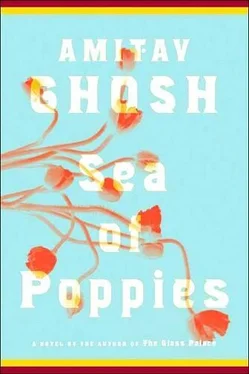When Nob Kissin was fourteen his uncle fell ill. Summoning the boy to his bedside, the old man had entrusted him with one last duty – his days were drawing to a close, he said, and it was his wish that his young wife, Taramony, be sent to an ashram in the holy city of Brindavan, to live out her widowhood: the journey being difficult and dangerous, he wanted Nob Kissin to escort her there personally before assuming his duties in the family temple.
It will be done, said Nob Kissin, touching his uncle's feet, you need say no more.
A few days later, the old man died, and shortly afterwards Nob Kissin set off for Brindavan, with his widowed aunt and a small retinue of servants. Although Nob Kissin was well past the usual age of marriage, he was still a brahmachari – a virginal celibate – as befitted a student who was undergoing the rigours of an old-fashioned education. The widow, as it happened, was not much older than Nob Kissin, for her late husband had married her only six years before, in a final effort to beget an heir. Through those years, Nob Kissin had rarely had occasion to meet or speak with his aunt, for he was often away, living with his gurus, in their tols, pathshalas and ashrams. But now, as the party travelled slowly westwards, towards Brindavan, the boy and his aunt were inevitably often in each other's company. That his aunt was a woman of uncommon charm and comeliness, Nob Kissin had always known – but he discovered now, to his astonishment, that she was also a person of extraordinary spiritual accomplishment, a devotee of a kind that he had never encountered before: one who spoke of the Lotus-Eyed Lord as if she had personally experienced the grace of his presence.
As a student and a brahmachari, Nob Kissin had been trained to turn his mind from sensual thoughts; in his education, so much stress was laid on the retention of semen that it was rarely, if ever, that the image of a woman succeeded in penetrating his mental defences. But now, rattling and rolling towards Brindavan, in a succession of boats and carriages, the boy's defences crumbled. Never once did Taramony permit him to touch her in an unchaste way – yet he would find himself trembling in her presence; at times his body would go into a kind of seizure, leaving him drenched in shame. At first he was merely confused and could think of no words to describe what was happening to him. Then he understood that his feeling for his aunt was but a profane version of what she herself felt for the divine lover of her visions; he understood also that only her tutelage could cure him of his bondage to his earthly desires.
I can never leave your side, he told her. I cannot abandon you in Brindavan. I would rather die.
She laughed and told him he was a foolish, vain fellow; Krishna was her only man, she said, the only lover she would ever have.
No matter, he said. You will be my Krishna and I will be your Radha.
She said incredulously: And you will live with me without touching me, without knowing my body, without knowing any other woman?
Yes, he said. Isn't that how you are with Krishna? Isn't that how the Mahaprabhu was?
And what of children?
Did Radha have children? Did any of the Vaishnav saints?
And your duties to your family? To the temple? What of all that?
I care nothing for such things, he said. You will be my temple and I will be your priest, your worshipper, your devotee.
When they reached the town of Gaya, she gave her assent: slipping away from their retainers, they turned around and made their way to Calcutta.
Although neither of them had been to the city before, they were not without resources. Nob Kissin still had their travel funds in his possession, as well as the silver that was to have provided the endowment for Taramony's incarceration in Brindavan. Put together, the sum was quite substantial, and it allowed them to rent a small house in Ahiritola, an inexpensive waterfront neighbourhood of Calcutta: there they took up residence, making no pretence of being anything other than they were, a widowed woman living with her nephew. No scandal ever attached to them, for Taramony's saintliness was so patently evident that she soon attracted a small circle of devotees and followers. Nob Kissin would have loved nothing better than to join this circle: to call her 'Ma', to be accepted as a disciple, to spend his days receiving spiritual instruction from her – this was all he wanted, but she would not allow it. You are different from the others, she told him, yours is a different mission; you must go into the world and make money – not just for our upkeep but as an endowment for the temple that you and I will build one day.
At her bidding, Nob Kissin went out into the city where his shrewdness and intelligence did not go long unnoticed. While working at the counter of a moneylender, in Rajabazar, he discovered that keeping accounts was no great challenge for someone of his education; having mastered it, he decided that his best hope for advancement lay in finding a place with one of the city's many English firms. To this end, he began to attend tutorial meetings in the house of a Tamil dubash – a translator who worked for Gillanders & Company, a big trading agency. He quickly established himself as one of the best students in the group, stringing together sentences with a fluency that astounded his master as well as his fellow pupils.
One recommendation led to another and one job to the next: starting as a serishta at Gillanders', Nob Kissin rose to become, successively, a carcoon at the Swinhoe factory, a cranny at Jardine & Matheson, a munshi at Ferguson Bros., and a mootsuddy at Smoult & Sons. It was from there that he found his way into the offices of Burnham Bros. where he rose quickly to the rank of gomusta and was entrusted with the shipping of migrant labour.
It was not just for his acumen and his fluency in English that Baboo Nob Kissin's employers valued his services: they appreciated also his eagerness to please and his apparently limitless tolerance of abuse. Unlike many others, he never took offence if a sahib called him a dung-brained gubberhead, or compared his face to a bandar's bunghole; if shoes or paperweights were hurled his way, then he would merely step aside, displaying a surprising agility for a man of his girth and weight. Insults he would endure with a detached, almost pitying smile: the one thing that put him out of countenance was to be struck by his employer's shoes or feet – which was scarcely to be wondered at, since such blows necessitated the inconvenience of a bath and a change of clothes. Indeed, he twice switched jobs to rid himself of employers who were too much in the habit of kicking their local staff. This too was one of the reasons why he found his present position particularly congenial: Mr Burnham might be a hard-driving man and a difficult taskmaster, but he never kicked or beat his employees and rarely swore. It was true that he often mocked his gomusta by addressing him as 'my Nut-Kissing Baboon' and the like, but he was generally careful to avoid these familiarities in public – and 'baboon', in any case, was not a term to which Baboo Nob Kissin could really object, since that creature was but an avatar of Lord Hanuman.
While furthering his employer's interests, Baboo Nob Kissin had not neglected to pursue a few opportunities of his own. Since much of his work consisted in acting as an intermediary and facilitator, he had acquired, over time, a wide circle of friends and acquaintances, many of whom relied on him for advice in matters pecuniary and personal. In time, his role as adviser turned into a thriving money-lending operation, often resorted to by gentlefolk who were in need of a discreet and reliable source of funding. There were some who came to him also for help in matters still more intimate: abstinent in all things but food, Baboo Nob Kissin regarded the carnal appetites of others with the detached curiosity with which an astrologer might observe the movements of the stars. He was unfailingly attentive to the women who appealed to him for assistance – and they in turn found him easy to trust, knowing that his devotion to Taramony would prevent him from exacting favours for himself. It was thus that Elokeshi had come to regard him as an indulgent and kindly uncle.
Читать дальше












